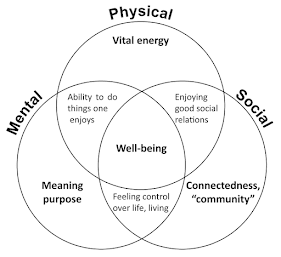Introduction
A complex idea that affects every part of our lives, health frequently defies precise description. Although we frequently mistakenly associate it with the absence of disease, health actually includes a wider range of factors. In this blog post, we will examine the idea of health from a holistic perspective, taking into account the three pillars of physical, mental, and social well-being.
Physical Fitness
The most traditional definition of health, physical health, centers on how our bodies are feeling. This includes things like dietary decisions, physical activity levels, and sleeping habits.
A person who is physically fit has a body that functions at its best and is free of illnesses and chronic diseases. But it goes beyond the simple absence of illness to include the development of a strong and resilient physical state.
Mental Health
Mental health, a critical facet of overall well-being, pertains to our emotional and psychological equilibrium and our capacity to adeptly navigate stress, anxiety, and life's challenges.
Emotional Well-Being: Cultivating an awareness of our emotions, acknowledging them, and mastering the skill of managing them form the bedrock of mental health.
Resilience: Mental health hinges not on the absence of negative emotions but on the ability to rebound resiliently from adversity and setbacks.
Self-Care: Engaging in self-care practices, such as mindfulness, meditation, or seeking professional assistance when needed, stands as a vital means to foster mental health.
Social Welfare.
Relationships and social ties have a key role in determining our general health. Our capacity to form and maintain wholesome relationships with others, establishing a sense of community and a support system, is referred to as social health.
Relationships: Our well-being is greatly influenced by the development and maintenance of healthy relationships with our family, friends, and communities.
Communication: Learning excellent communication techniques is essential for resolving issues and maintaining positive relationships with others.
Support networks: Having a solid support network enables us to deal with life's challenges and offers consolation through difficult moments.
Holistic Health
In reality, health is the result of a complex interaction of physical, mental, and social elements. All of these aspects of our well-being must receive thorough attention if we are to achieve optimal health.
Conclusion
Health is a condition of physical, mental, and social well-being beyond disease's simple absence. We must vigilantly adhere to every aspect of our lives if we want to live a healthy life.
We can work toward a holistic condition of health that enhances our lives and raises our level of existence by nourishing our bodies, minds, and meaningful connections.
It is crucial to keep in mind that maintaining good health requires daily effort and is not a destination that can be reached.





2 Comments
Great Knowledge
ReplyDeleteOutstanding Blog
ReplyDelete